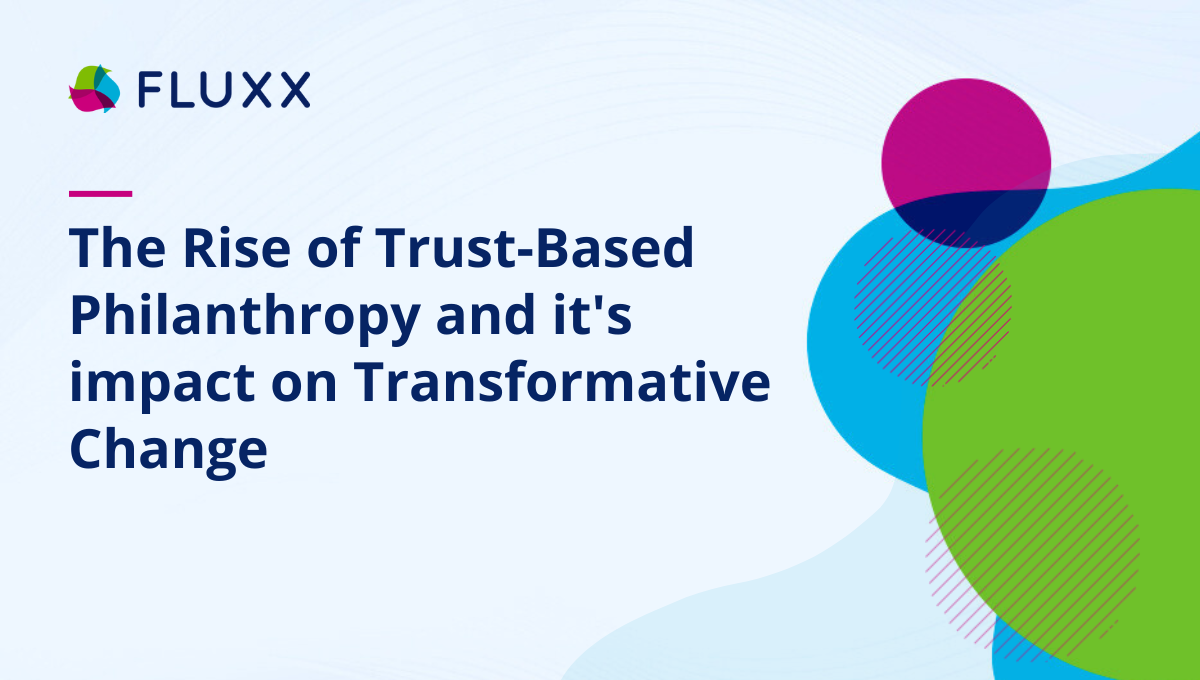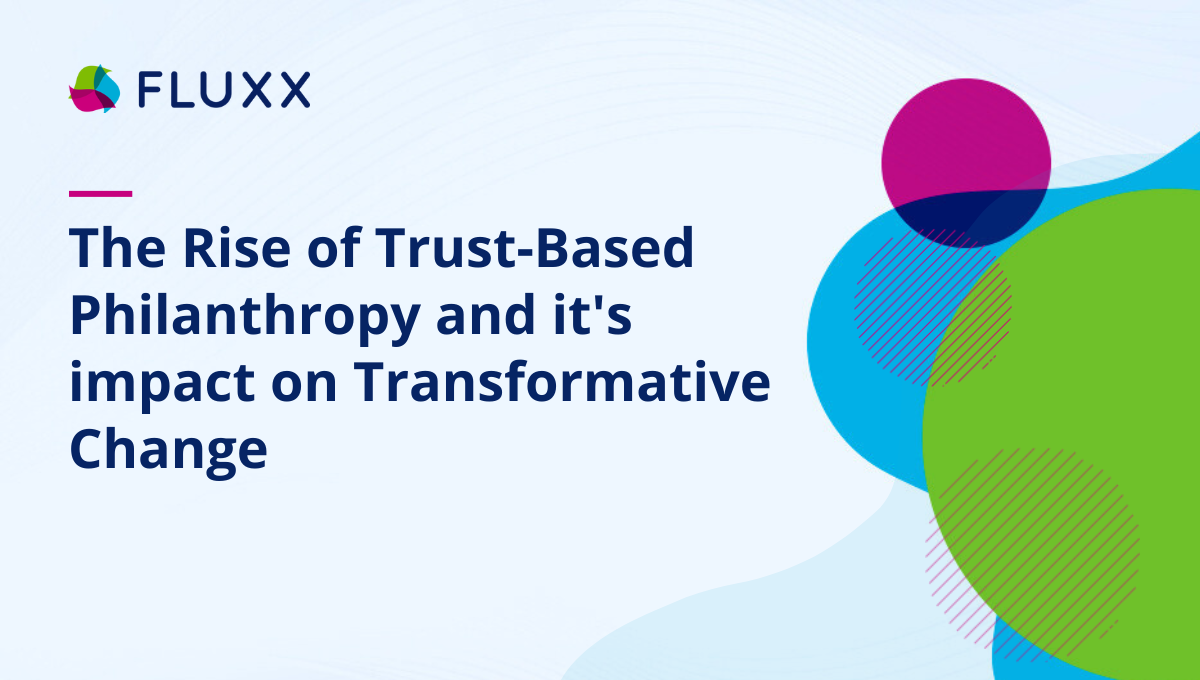Imagining a Future Good: Trends, Action, and Joy with Trista Harris
Futurist Trista Harris joins Untapped Philanthropy to explore how the social sector can prepare for uncertainty by imagining long-term futures and...
Be the first to know about new Fluxx grants management resources, blog articles and podcasts.

 A Brief History of Trust-Based Philanthropy
A Brief History of Trust-Based PhilanthropyPhilanthropy has long been a cornerstone of societal progress, with individuals and organizations providing the financial resources needed to address pressing issues and support the common good. However, traditional grantmaking approaches — shaped in part by the same exclusionary practices nonprofits seek to address — have too often fallen short in their effectiveness and impact, leading grantmakers to examine their roles in contributing to systemic inequality. In recent years, the emergence of trust-based philanthropy has kindled hopes of a transformative path for philanthropy to more effectively create lasting change. The following explores the origins, principles, and potential of trust-based philanthropy as a catalyst for a better future.
Trust-based philanthropy first took root in the early 2000s when many philanthropic leaders began questioning whether traditional grantmaking practices produce skewed results due to power imbalances and burdensome requirements. Recognizing that a shift was necessary to empower grantee organizations and ensure a more equitable distribution of resources, they sought a fair and inclusive approach that prioritized grantees’ needs and expertise. Over the past decade, the concept of trust-based philanthropy has gained significant traction, gaining the attention and endorsement of major foundations, influential philanthropists, and grassroots movements.
Trust-based philanthropy is a relational approach that prioritizes trust, transparency, and collaboration between funders and grantees. It is grounded in the belief that the recipients of grant funding — nonprofit organizations — are the ones best equipped to identify and address the needs of their communities. Rather than imposing strict guidelines and conditions on giving, trust-based philanthropy emphasizes unrestricted funding, multi-year grants, and reduced reporting requirements. By centering on trust, this approach aims to empower grantees and enable them to work more effectively toward their missions.
Traditional grantmaking practices have long been criticized for their inherent power imbalances, in particular the power dynamic between funders and grantees that places the former in a dominant position, dictating the priorities and strategies of the latter. This top-down approach can limit the autonomy and creativity of grantees, hindering their ability to respond to community needs effectively.
Among the most criticized aspects of traditional grantmaking are the onerous requirements and restrictions imposed on grantees, such as overly-detailed reporting, project-specific funding, and short-term grants. Burdensome practices like these divert significant time and resources away from the actual work on the ground, leading to inefficiencies and preventing grantees from achieving the desired impact. Moreover, these resource and labor-intensive processes mean that emerging, grassroots, and BIPOC-led organizations often face barriers to accessing philanthropic funding, further perpetuating systemic inequalities within the sector.
The Implications of Trust-Based Philanthropy on Grantmaking Institutions
Adopting a trust-based approach requires a fundamental shift in mindset and a commitment to dismantling power imbalances and biases. Grantmakers must engage in constant self-reflection to identify and address their own biases, as well as the broader systemic barriers that perpetuate inequities. Central to trust-based philanthropy is the principle of providing multi-year unrestricted funding. This approach recognizes the importance of providing flexible resources that enable grantees to allocate funds according to their priorities and respond dynamically to emerging needs. By offering unrestricted funding, grantmakers demonstrate trust in the expertise and knowledge of grantees, empowering them to make informed decisions that drive sustainable change.
Grantmaking institutions must foster a culture of trust, empathy, and learning. This involves creating spaces for meaningful dialogue, actively seeking feedback from grantees, and recognizing the expertise and insights of nonprofit organizations working on the ground. Grantmakers should actively involve grantees in the decision-making process, seeking their input, and incorporating their perspectives. This participatory approach ensures that grantmaking strategies align with the changing needs and aspirations of the communities being served. Transparent and responsive communication is essential for building trust and fostering effective partnerships. Grantmakers should maintain open lines of communication with grantees, actively seeking feedback and engaging in honest dialogue. This transparency promotes a culture of learning and continuous improvement, ensuring that grantmaking practices remain responsive and relevant.
Structural changes may be necessary to align the organization's operations with trust-based principles. This could involve streamlining administrative processes, reducing bureaucracy, and reallocating resources to support the capacity-building needs of grantees. Simplifying reporting requirements is another key practice of trust-based philanthropy. Traditional grant reporting can be burdensome and time-consuming for grantees, diverting their attention from their core work. By streamlining reporting processes and focusing on outcomes rather than rigid metrics, grantmakers can reduce administrative burdens and allow grantees to focus on achieving their mission.
Trust-based philanthropy is founded on six practices that provide a basis for transforming the grantmaker/grantee relationship. They are:
Provide Unrestricted Funding: Trust-based philanthropy recognizes that unrestricted funding allows grantees to allocate resources where they are most needed, encouraging innovation and adaptability.
Support Multi-Year Grants: Multi-year funding provides stability, enabling grantees to plan for the long term rather than being confined to short-term projects and funding cycles.
Simplify Reporting Requirements: Reducing the burden of reporting frees up valuable time and resources, allowing grantees to focus on their mission-driven work.
Engage in Active Listening and Learning: Grantmakers commit to actively listening to grantees and learning from their experiences, recognizing that those closest to the issues are often best positioned to develop effective solutions.
Offer Non-Financial Support: Grantmakers move beyond transactional relationships with grantees by offering non-financial resources, such as technical assistance, capacity-building opportunities, and connections to networks and resources.
Foster Collaborative Relationships: Trust-based philanthropy encourages collaborative relationships between funders and grantees, recognizing that collective efforts are a more effective means of addressing complex social challenges.
In a trust-based context, there isn't a consensus on which approach works best — open applications or invitation-only. Each has its own considerations that grantmakers must take into account.
Transparency is key to an equitable open application process. Being clear about grantmaking priorities helps to ensure that requirements don't alienate organizations that are volunteer-run, fiscally sponsored, or in earlier life stages. Grantmakers may consider providing support and guidance to organizations during the application process to increase inclusivity and accessibility.
For grantmakers that do not accept unsolicited proposals, it is important to explain why and offer transparent explanations about how prospective grantees are identified. It is possible to widen the reach and consider a diverse range of organizations and perspectives if grantmakers are intentional about looking beyond their usual circles by attending community events, talking to community leaders, and actively diversifying grantmaking committees.
Trust-based philanthropy holds immense potential for shaping the future of philanthropy and creating meaningful change. By centering trust, transparency, and collaboration, this approach can lead to increased efficacy and responsiveness of grantee organizations, stronger funder/recipient relationships, and a more equitable nonprofit ecosystem.
When grantmakers trust the expertise and knowledge of grantees, they enable them to address community needs in a way that is responsive, relevant, and sustainable. This shift in power dynamics yields a more equitable distribution of resources, amplifying the voices and impacts of emerging, grassroots, and BIPOC-led organizations. Ultimately, trust-based philanthropy has the power to transform the sector, enabling it to better serve society's most pressing challenges and create a better future for all.
Futurist Trista Harris joins Untapped Philanthropy to explore how the social sector can prepare for uncertainty by imagining long-term futures and...
Geneva Pritchard joins us to breaks down the practice of trust-based giving and how this movement has enabled communities worldwide to support...
Learn how the Trust Based Philanthropy Project funder initiative is designed to address the inherent power imbalances between foundations and...
Be the first to know about new Fluxx grants management resources, blog articles and podcasts.